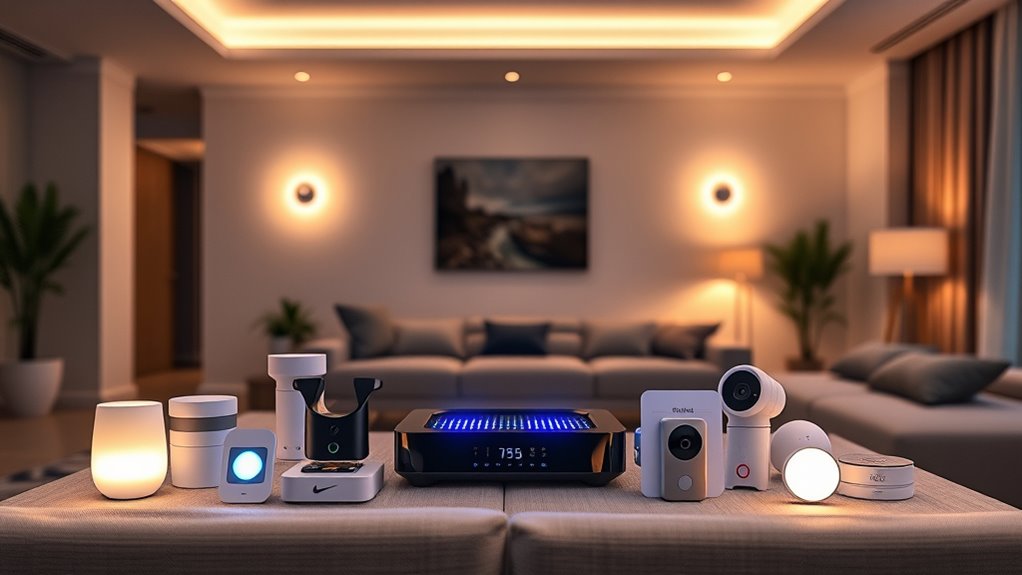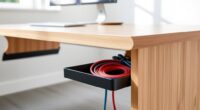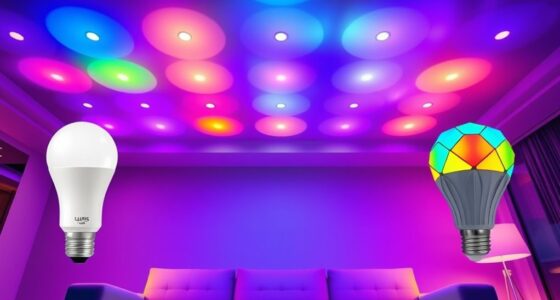If you’re looking for the best smart home hubs supporting Zigbee and Matter in 2025, I recommend options like the Aqara M3, SONOFF Zigbee Bridge Ultra, and ThirdReality MZ1, which offer robust compatibility and local control. These hubs work seamlessly with popular platforms like Apple HomeKit, Alexa, and Google, ensuring smooth automation even during internet outages. Keep exploring, and you’ll discover key features to help you choose the perfect hub for your smart home needs.
Key Takeaways
- Top hubs support both Zigbee and Matter protocols for broad device compatibility and future-proof smart home setups.
- Many hubs offer local automations and control, ensuring operation without internet dependency.
- Compatibility with major platforms like Apple HomeKit, Alexa, Google, and SmartThings enhances ecosystem integration.
- Easy setup, secure connectivity, and energy management features make these hubs suitable for seamless smart home control.
- The best options include scalable solutions for large homes and support OTA updates for ongoing improvements.
Hub Mini Smart Home Hub for Alexa, SmartThings, Philips Hue, Nanoleaf, Govee, and Flic Buttons
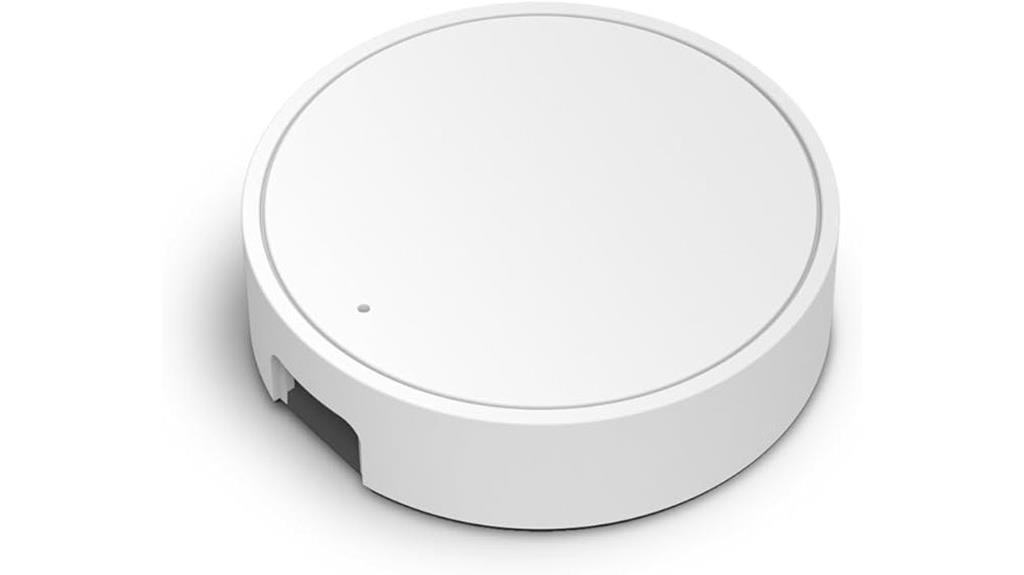
If you’re looking for a compact yet powerful smart home hub that seamlessly connects various devices and controllers, the Hub Mini is an excellent choice. It links Flic Controllers with popular smart platforms like Alexa, SmartThings, Philips Hue, Nanoleaf, and Govee, ensuring broad compatibility. With a range of up to 50 meters (150 feet), it provides reliable, long-distance connectivity. The Hub Mini also extends Flic Controller battery life beyond two years and responds in under 0.1 seconds, enabling instant control. Its discreet, small design makes it easy to place anywhere, making it a versatile addition to your smart home setup.
Best For: smart home enthusiasts seeking a compact, reliable hub to connect multiple devices and controllers across popular platforms with long-range coverage.
Pros:
- Provides seamless integration with Alexa, SmartThings, Philips Hue, Nanoleaf, Govee, and Flic Buttons
- Long-range connectivity up to 50 meters (150 feet) for reliable device control
- Extends Flic Controller battery life to over 2 years with ultra-fast response times under 0.1 seconds
Cons:
- Requires separate Flic Controllers to operate the hub
- Limited to compatible smart devices and controllers, may need additional setup for some systems
- Compact design may limit physical ports or expandability options
MOES ZigBee 3.0 Hub/Wired Gateway for Smart Home
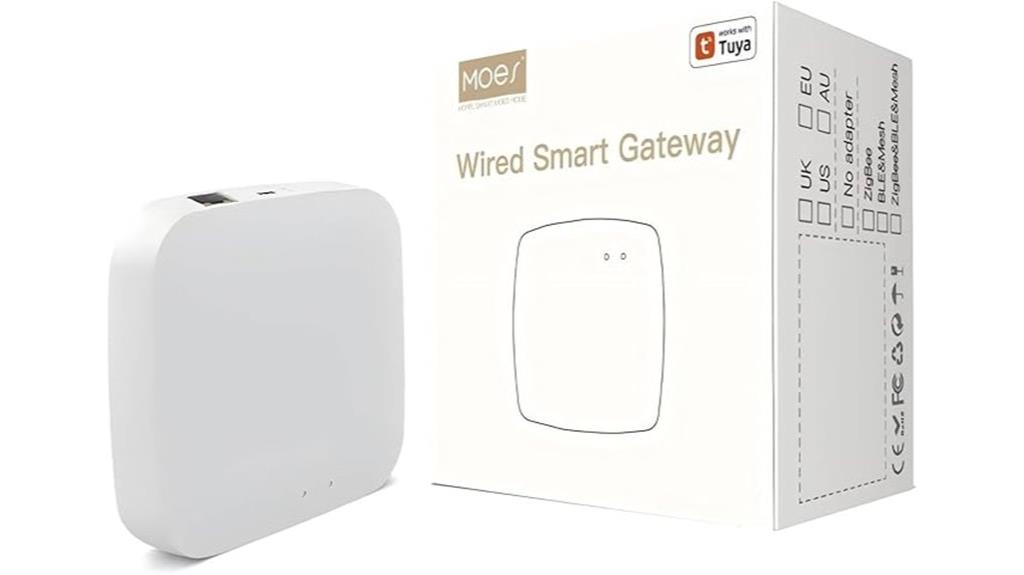
The MOES ZigBee 3.0 Hub/Wired Gateway stands out as an excellent choice for homeowners seeking a reliable, easy-to-install bridge that seamlessly connects multiple ZigBee devices. Compact and straightforward, it supports over 200 meters of coverage and connects around 20 devices, including sensors, plugs, lights, and locks. Compatible with Tuya, SmartLife, Google Home, and Home Assistant, it offers stable ZigBee connectivity and wired Ethernet options for added stability. While setup can sometimes be challenging, especially with language barriers, its performance and broad device compatibility make it a solid addition to any smart home ecosystem. Overall, it’s an affordable, dependable hub for expanding your smart home network.
Best For: homeowners seeking a reliable, easy-to-install ZigBee hub compatible with multiple platforms to expand their smart home ecosystem.
Pros:
- Stable ZigBee connectivity with a broad range of compatible devices
- Compact design with wired Ethernet for enhanced stability
- Supports multiple popular platforms including Tuya, SmartLife, Google Home, and Home Assistant
Cons:
- Setup can be challenging, especially with language barriers and device migration
- Overly bright LED indicators with no option to turn off
- Limited support for proprietary or Amazon-specific smart devices
ZigBee Smart Plug 15A, Energy Monitoring, Compatible with Alexa & Google Home (4 Pack)
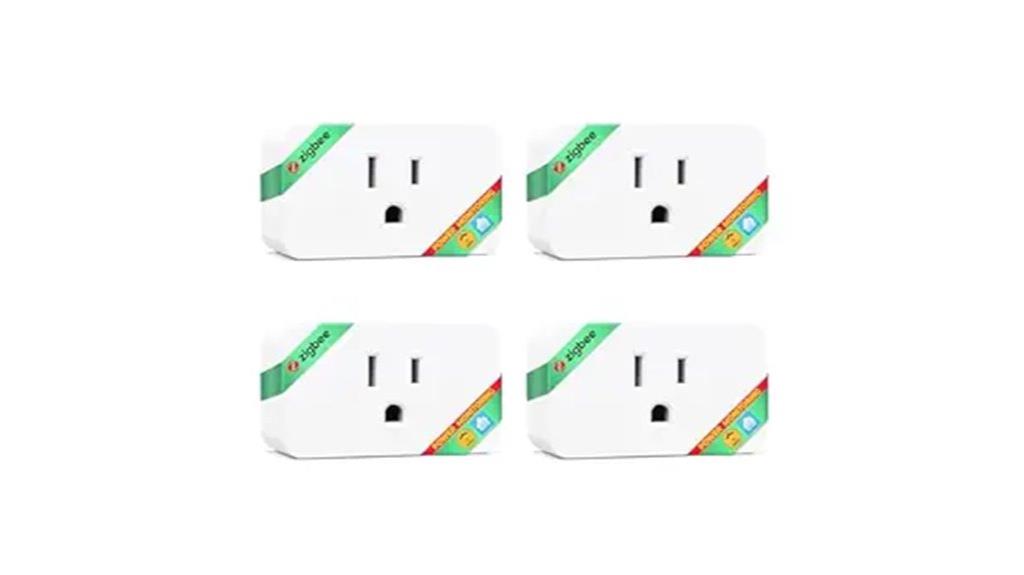
The ZigBee Smart Plug 15A, Energy Monitoring, compatible with Alexa and Google Home, stands out as an excellent choice for those who want to effortlessly expand their smart home network. With support for ZigBee 3.0, it integrates smoothly with hubs like SmartThings and Home Assistant, doubling as a ZigBee repeater to boost network stability. It handles up to 15A of power, making it perfect for lamps and electronics, while providing real-time energy use data via the Nous Smart App. Its compact design fits into standard outlets, and voice control through Alexa and Google simplifies managing connected devices. Overall, it’s a reliable, easy-to-use addition for smarter living.
Best For: smart home enthusiasts seeking a reliable, easy-to-integrate ZigBee smart plug with energy monitoring and voice control compatibility.
Pros:
- Seamless integration with ZigBee hubs like SmartThings and Home Assistant, functioning as a network extender.
- Supports up to 15A load with real-time energy monitoring via the Nous Smart App.
- Compact design with child lock, configurable LED indicators, and compatibility with Alexa and Google Assistant.
Cons:
- Requires a ZigBee gateway (sold separately) for setup and operation.
- Chunky size may block adjacent outlets in some double socket setups.
- Physical button and LED controls can be disabled, which might limit manual operation in certain situations.
Aqara Smart Hub M3 for Home Automation
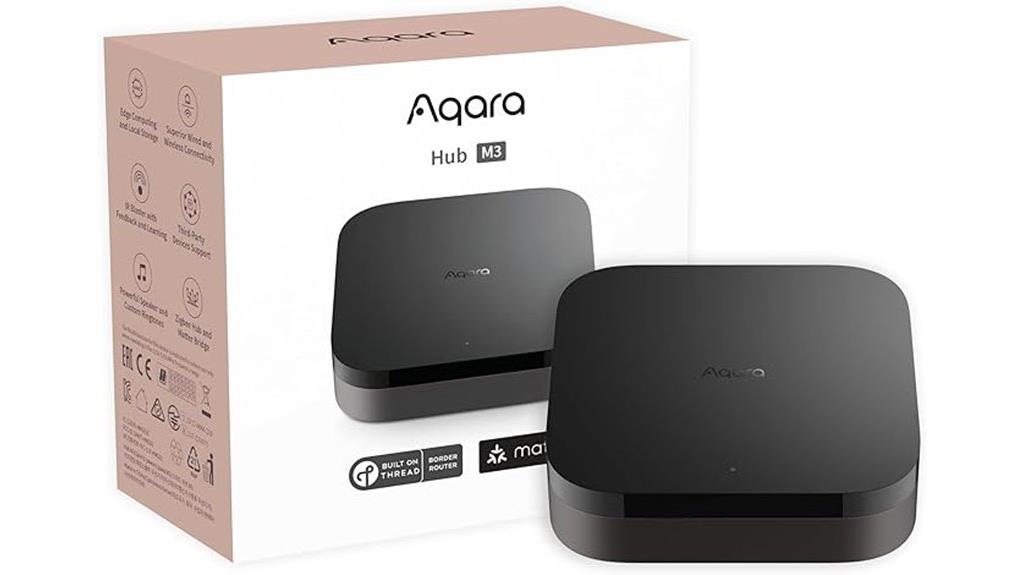
For home automation enthusiasts who prioritize local control and seamless integration across multiple ecosystems, the Aqara Smart Hub M3 stands out as an excellent choice. It supports Zigbee, Thread, Bluetooth, Wi-Fi, PoE, IR, and Matter protocols, allowing it to connect up to 127 Aqara devices and 127 Thread devices (with repeaters). Compatible with Alexa, Apple HomeKit, SmartThings, and IFTTT, it functions as a central controller for diverse platforms. Its edge computing capabilities assure automations run locally even without internet. With a straightforward setup, robust security features, and advanced automation options like a smart IR blaster and Matter bridge, the M3 offers reliable and versatile smart home management.
Best For: home automation enthusiasts seeking a versatile, locally-controlled hub that supports multiple protocols and ecosystems, including Aqara devices, Matter, and third-party platforms.
Pros:
- Supports a wide range of protocols including Zigbee, Thread, Bluetooth, Wi-Fi, PoE, IR, and Matter for comprehensive device compatibility.
- Emphasizes local control with Edge Hub capabilities, ensuring automations run smoothly without internet dependence.
- Easy setup with advanced automation features like a smart IR blaster and Matter bridge for seamless device integration and scene synchronization.
Cons:
- Higher price point compared to some other hubs, which may be a consideration for budget-conscious users.
- Limited native support for third-party Zigbee devices, restricting ecosystem flexibility.
- App interface can be chaotic and confusing, and some users experience connectivity or stability issues, especially with third-party platform integrations.
Matter Smart Home Hub, Thread & Tuya Zigbee 3.0
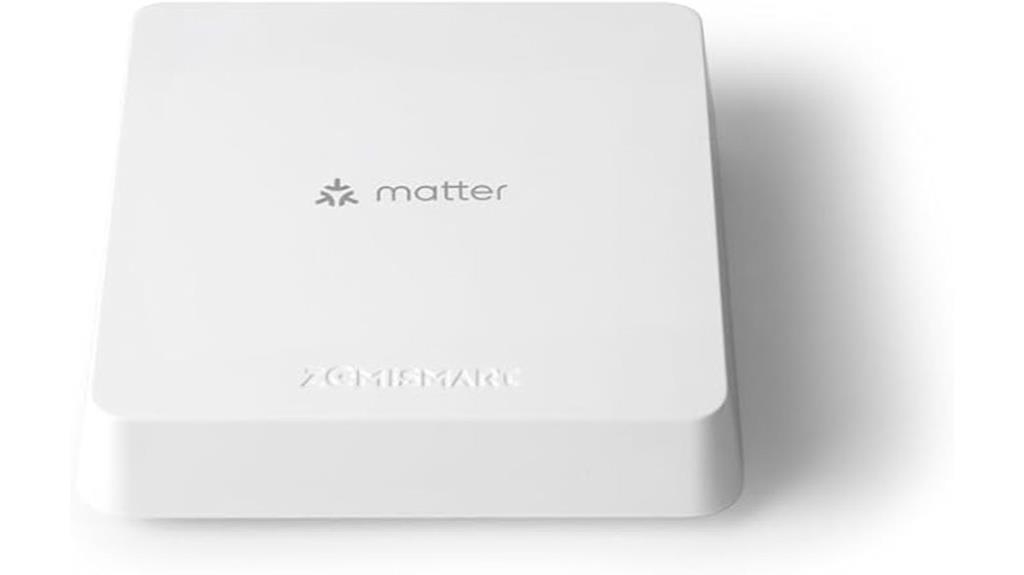
If you’re looking to create a flexible, multi-protocol smart home system, a Matter Smart Home Hub supporting Thread and Tuya Zigbee 3.0 could be your best choice. It handles Tuya Zigbee 3.0 and Thread devices, though not all Zigbee devices are compatible—verified Zemismart (Blindsmart) devices work best. The hub enables seamless operation across protocols, but a Matter border router is needed for complete integration. It allows control over Tuya Zigbee and Thread devices via third-party platforms like Google Home and Apple HomeKit. You can manage devices remotely and use voice commands through Siri and Google Assistant, making your smart home more versatile and user-friendly.
Best For: smart home enthusiasts seeking a versatile, multi-protocol hub that supports Thread and Tuya Zigbee 3.0 devices for seamless integration and remote control.
Pros:
- Supports multiple protocols including Thread and Tuya Zigbee 3.0 for broad device compatibility
- Enables control via third-party platforms like Google Home and Apple HomeKit
- Allows remote management and voice control with Siri and Google Assistant
Cons:
- Not all Zigbee devices are compatible; verified Zemismart devices are recommended
- Requires a Matter border router for full Matter system integration
- Compatibility limitations may restrict control over certain Zigbee devices
Aqara Smart Hub M3 for Home Automation

Anyone looking for a reliable, local-control home automation hub that supports multiple protocols will find the Aqara Smart Hub M3 an excellent choice. It supports Zigbee, Thread, Bluetooth, Wi-Fi, PoE, IR, and Matter, making it highly versatile. The hub integrates Aqara and third-party devices into the Aqara Home app and works seamlessly with Alexa, Apple HomeKit, SmartThings, and IFTTT. Its advanced features include local automations, a smart IR blaster, and a Matter bridge for ecosystem integration. With secure dual-band Wi-Fi, PoE, and encrypted local storage, it offers stability and privacy. Overall, the M3 is a powerful, adaptable hub for comprehensive home automation.
Best For: users seeking a versatile, reliable home automation hub with robust local control and multi-protocol support, especially within Aqara and Matter ecosystems.
Pros:
- Supports a wide range of protocols including Zigbee, Thread, Bluetooth, Wi-Fi, PoE, IR, and Matter for comprehensive device compatibility.
- Emphasizes local control and automations, ensuring continued operation without internet dependency.
- Offers advanced features like a smart IR blaster and Matter bridge for seamless ecosystem integration.
Cons:
- Higher price point compared to other hubs with similar features.
- Limited native support for third-party Zigbee devices beyond Aqara ecosystem, restricting flexibility.
- App interface can be chaotic and confusing, with device dashboards only accessible on mobile devices.
SONOFF Zigbee Bridge Pro Hub, ZigBee 3.0 Smart Gateway

The SONOFF Zigbee Bridge Pro Hub stands out for its impressive support of up to 128 Zigbee devices, making it an ideal choice for those looking to build an extensive and scalable smart home system. Its compatibility with popular SONOFF Zigbee products like the ZBMINI-L smart switch and S26R2ZB smart plug broadens automation options. With dual Wi-Fi and Zigbee support, connectivity remains reliable and seamless. It offers smart security modes—home, away, sleep—plus local scene and automation control, even during network outages. Designed for app control, this hub combines strong connectivity, security, and scalability, ensuring a flexible, integrated smart home setup.
Best For: smart home enthusiasts seeking a scalable, reliable Zigbee hub with extensive device support and local automation capabilities.
Pros:
- Supports up to 128 Zigbee devices for large-scale home automation
- Compatible with popular SONOFF Zigbee products like smart switches and plugs
- Dual Wi-Fi and Zigbee support ensure stable and seamless connectivity
Cons:
- May require a learning curve for initial setup and configuration
- Limited to SONOFF-compatible Zigbee devices for optimal performance
- Does not specify integration with third-party smart home ecosystems beyond Zigbee and Wi-Fi
MOES ZigBee 3.0 & Bluetooth & Mesh Hub for Tuya Devices
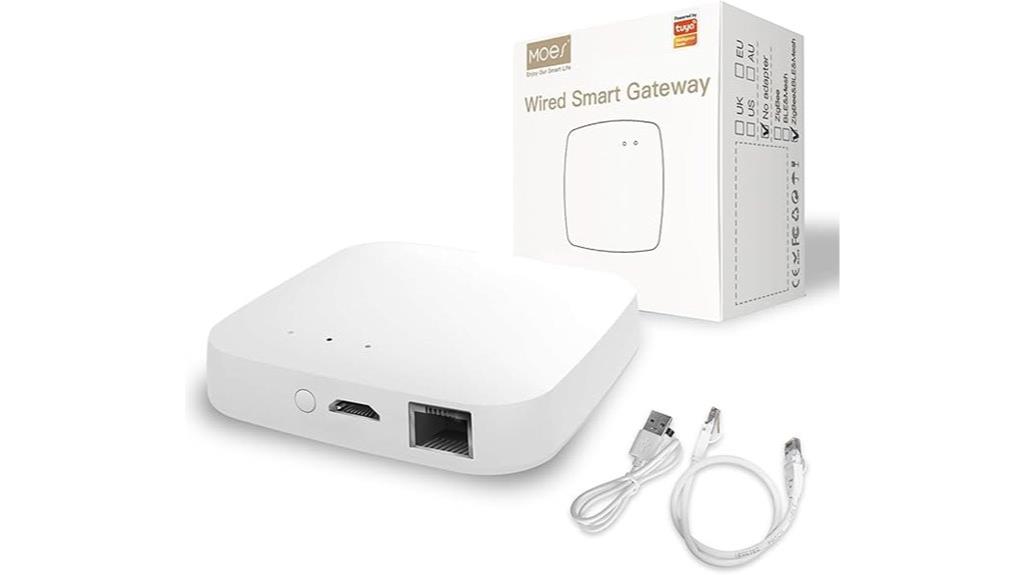
Designed for DIY enthusiasts and homeowners looking to expand their smart home setups, the MOES ZigBee 3.0 & Bluetooth & Mesh Hub stands out with its multi-protocol support. It connects ZigBee 3.0, Bluetooth (BLE), Mesh (SIG), and 2.4GHz WiFi, making it compatible with Tuya devices and the Smart Life app. Supporting up to 128 devices, it manages Bluetooth locks, sensors, and smart plugs through dual modes—Bluetooth mesh and ZigBee 3.0—simplifying setup. The compact, USB-powered design fits easily anywhere, and it offers reliable ZigBee connectivity, voice control via Alexa and Google Home, and integration with platforms like Home Assistant for seamless automation.
Best For: DIY enthusiasts and homeowners seeking a versatile, multi-protocol smart home hub to expand and manage their Tuya-compatible devices with ease.
Pros:
- Supports multiple protocols including ZigBee 3.0, Bluetooth BLE, Mesh, and WiFi, allowing broad device compatibility
- Compact and USB-powered design for flexible placement without needing additional power sources
- Easy setup with reliable connectivity and integration with voice assistants like Alexa and Google Home
Cons:
- Some users report connectivity issues or device incompatibility with certain routers or smart devices
- Bright activity LEDs with no option to disable can be distracting in dark environments
- Higher price point relative to basic hubs, with some questioning the robustness of ZigBee integration
ThirdReality Smart Bridge MZ1 — Zigbee to Matter Connectivity
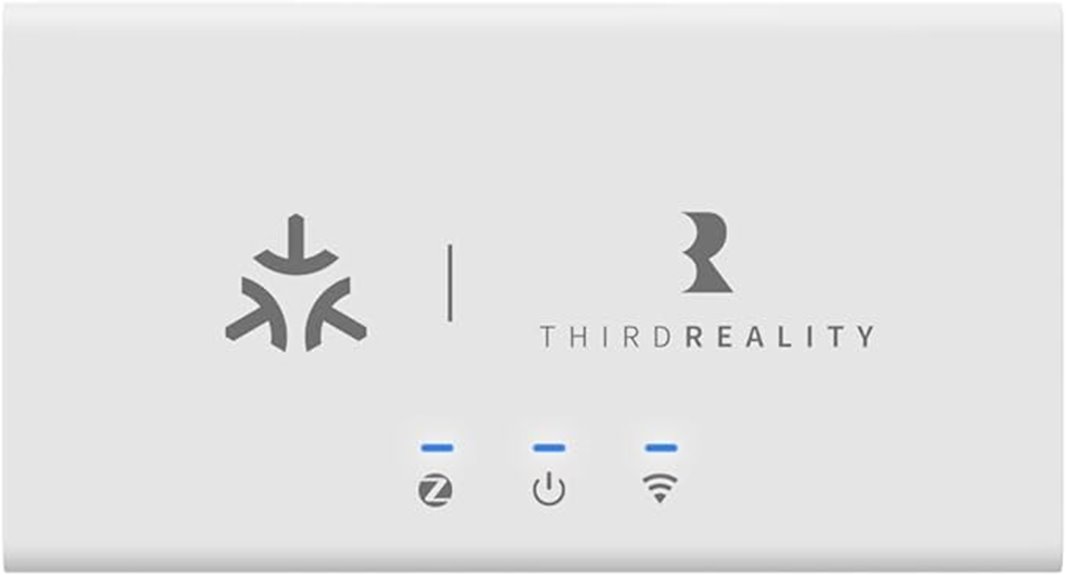
Looking for a reliable way to connect your Zigbee devices directly to the emerging Matter ecosystem? The ThirdReality Smart Bridge MZ1 offers a simple solution. It connects Zigbee sensors, bulbs, and plugs to major platforms like Apple HomeKit, Google Assistant, SmartThings, and Home Assistant, all without relying on cloud services. Operating on Wi-Fi, it supports OTA updates via the 3R-Installer app and features a compact design with USB-C power. While setup is straightforward, some users experience range and stability issues, especially outdoors. Overall, it’s a practical, affordable device for small indoor setups, reviving Zigbee devices and enhancing local control within your smart home ecosystem.
Best For: homeowners seeking an affordable, local-control bridge to connect Zigbee devices to the Matter ecosystem, especially in small indoor environments.
Pros:
- Supports multiple major platforms including Apple HomeKit, Google Assistant, SmartThings, and Home Assistant
- Enables local control of Zigbee devices without relying on cloud services
- Supports OTA firmware updates via the 3R-Installer app for ongoing improvements
Cons:
- Limited range, especially outdoors, leading to connectivity issues with sensors and devices
- Inconsistent energy monitoring performance on Zigbee plugs
- Setup and firmware updates can sometimes be challenging, requiring multiple attempts
Aqara Smart Hub M100 for Home Automation
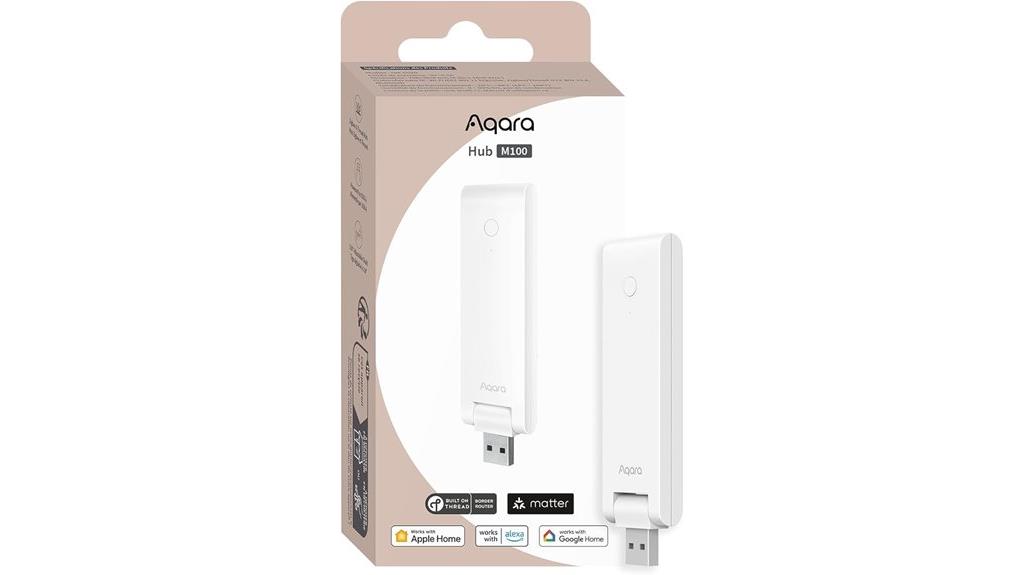
If you’re seeking a reliable hub that seamlessly connects Aqara devices with broader smart home ecosystems, the Aqara Smart Hub M100 is an excellent choice. It supports Aqara Zigbee (not third-party Zigbee) and Thread devices, connecting up to 20 of each. As a Matter Bridge, it links Aqara products with Apple HomeKit, Amazon Alexa, and Home Assistant, enabling extensive automation. The M100 offers quick, local automation execution with millisecond response times, even without Wi-Fi. Its Wi-Fi 6 support ensures fast, secure connections, while the universal USB-A port and adjustable shaft make installation flexible and convenient. This hub is perfect for expanding and simplifying your smart home setup.
Best For: smart home enthusiasts seeking reliable, fast, and versatile integration of Aqara devices with multiple ecosystems and future expansion options.
Pros:
- Supports multiple protocols including Aqara Zigbee and Thread, enabling broad device compatibility
- Provides fast, local automation execution with millisecond response times, reducing reliance on internet connectivity
- Features Wi-Fi 6 for secure, high-speed wireless connections and flexible power options via USB-A port
Cons:
- Limited to Aqara Zigbee devices (not third-party Zigbee), which may restrict device choices
- Cloud-dependent automations like push notifications still require internet access
- Compatibility and feature updates depend on ongoing firmware and ecosystem support
Linkind Matter Smart Plug, 4-Pack

The Linkind Matter Smart Plug 4-Pack is an excellent choice for anyone seeking reliable, local control over their smart devices without relying solely on internet connectivity. It’s Matter-certified, working seamlessly with platforms like Apple Home, Siri, Alexa, Google, SmartThings, and AiDot. Setup is quick and easy—just connect to certified hubs or use the AiDot app for direct control, eliminating the need for multiple apps. It supports 2.4GHz Wi-Fi and IPv6, ensuring control remains even if your internet drops. With voice commands, scheduling, and safety features, this pack offers flexible, energy-efficient automation perfect for any home.
Best For: smart homeowners seeking easy, reliable, and local control over their devices with compatibility across multiple platforms and no dependency on continuous internet connectivity.
Pros:
- Seamless compatibility with major platforms like Apple Home, Alexa, Google, SmartThings, and AiDot
- Supports local control via Matter protocol even if internet is down
- Easy setup with no need for multiple manufacturer apps and includes scheduling and safety features
Cons:
- Only supports 2.4GHz Wi-Fi networks, not 5GHz
- Requires a Matter-certified hub/controller for full platform integration unless using the AiDot app
- Limited to 1800W/15A power capacity, which may not suit high-power appliances
Zigbee 3.0 US B Dongle Gateway
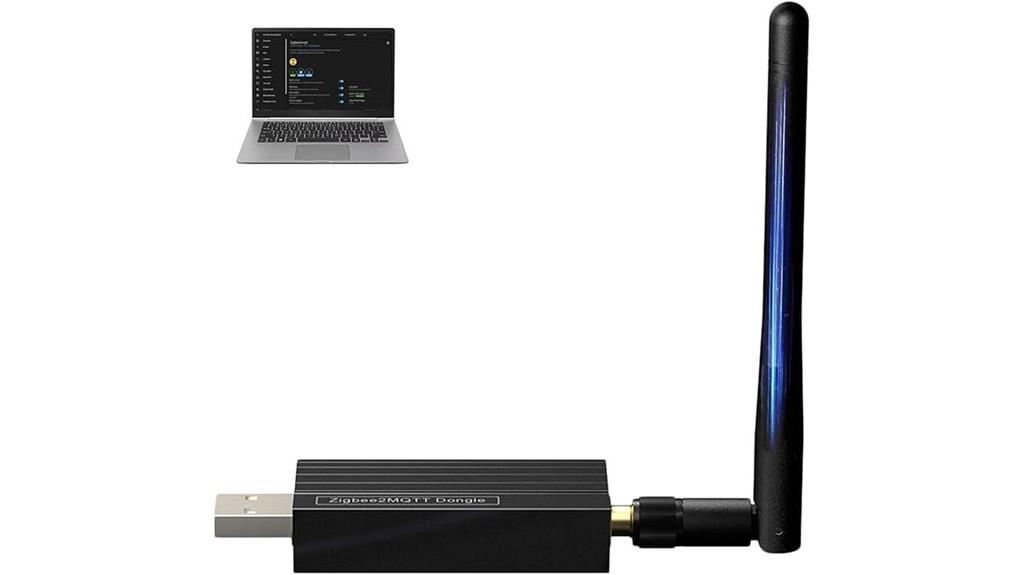
The Zigbee 3.0 US B Dongle Gateway is an ideal choice for DIY enthusiasts and smart home users who want to easily integrate a wide range of ZigBee devices without complicated setups. It works with open-source platforms like Home Assistant, ZigBee2MQTT, and Open HAB, and requires no manual firmware flashing. Equipped with powerful chips and an aluminum housing, it offers strong signal coverage and minimal interference. This compact device supports ZigBee 3.0 standards, ensuring broad compatibility across brands for sensors, locks, switches, and bulbs. Installation is straightforward—just plug it into your computer or server, and you’re ready to manage your smart devices seamlessly.
Best For: DIY smart home enthusiasts and users seeking an easy, reliable way to integrate a wide variety of ZigBee devices across different open-source platforms without complex setup.
Pros:
- Supports open-source platforms like Home Assistant, ZigBee2MQTT, and Open HAB for versatile integration
- No manual firmware flashing required, simplifying the setup process
- Strong signal coverage with minimal interference thanks to high-performance chips and aluminum housing
Cons:
- Compatibility may vary with some proprietary ZigBee devices or firmware versions
- Requires a compatible computer or server for operation, which may not suit all users
- Limited physical ports or expansion options beyond the USB dongle itself
SONOFF Zigbee Bridge Ultra Smart Hub (Matter Compatible)
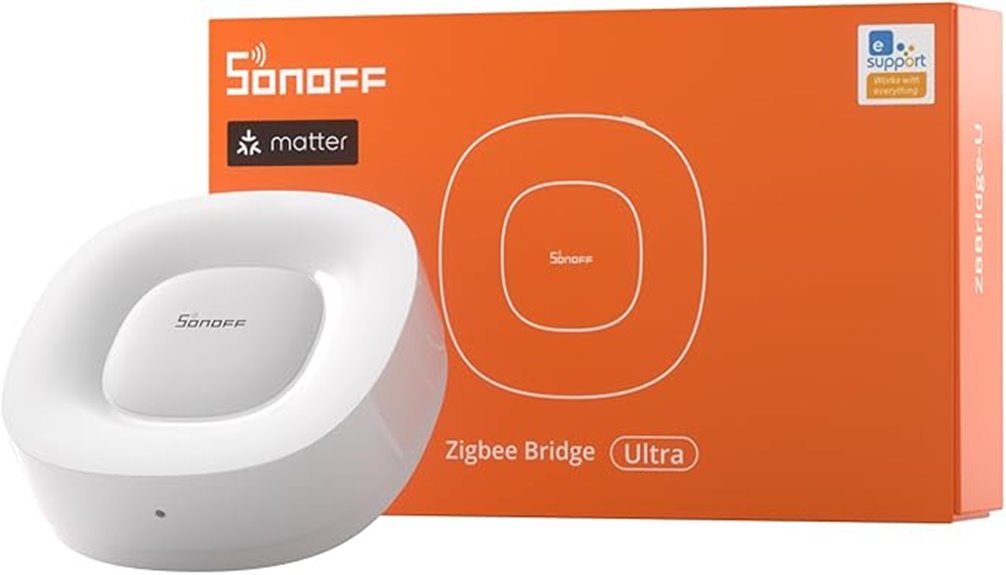
For anyone seeking seamless integration between Zigbee devices and the broader Matter ecosystem, the SONOFF Zigbee Bridge Ultra Smart Hub stands out as an ideal choice. It supports SONOFF Zigbee sub-devices and integrates smoothly with the eWeLink ecosystem, while acting as a Matter bridge when on the same LAN. Powered by a Zigbee 3.0 chip, a dual-core CPU, and ample memory, it offers reliable automation performance. With support for up to 256 devices and a range of 200 meters outdoors, it ensures strong connectivity. Plus, its smart security features, including alarms and customizable scenes, make it a versatile hub for modern smart homes.
Best For: smart home enthusiasts seeking seamless Zigbee and Matter ecosystem integration with reliable connectivity and security features.
Pros:
- Supports up to 256 Zigbee devices with a range of 200 meters outdoors
- Acts as a Matter bridge for easy integration across platforms on the same LAN
- Equipped with robust hardware including a Zigbee 3.0 chip, dual-core CPU, and ample memory for reliable performance
Cons:
- Limited to SONOFF Zigbee sub-devices and eWeLink ecosystem; not compatible with all Zigbee brands
- Requires on LAN for Matter bridging; may need network configuration for optimal setup
- Advanced features like alarms and scenes may require some technical setup for customization
ThirdReality Smart Bridge MZ1 Zigbee to Matter Connectivity

If you’re looking to upgrade your Zigbee devices to support the newer Matter protocol without replacing your existing hubs, the ThirdReality Smart Bridge MZ1 is an excellent choice. It connects Zigbee devices to platforms like Apple HomeKit, Google Assistant, SmartThings, and Home Assistant, operating on 2.4 GHz Wi-Fi with USB-C power. Setup is simple via the 3R-Installer app, and it supports OTA firmware updates. While it improves responsiveness for indoor Zigbee devices, some users report range issues and inconsistent energy monitoring, especially outdoors. Overall, it’s a practical, low-profile solution for integrating Zigbee into a Matter-enabled smart home ecosystem.
Best For: homeowners seeking to upgrade their existing Zigbee devices to Matter protocol support without replacing their hubs, especially for indoor smart home setups.
Pros:
- Facilitates seamless Zigbee to Matter connectivity with major smart platforms like Apple HomeKit, Google Assistant, and SmartThings.
- Supports OTA firmware updates, ensuring the device stays current with improvements and fixes.
- Compact, user-friendly design with simple setup via the 3R-Installer app, making it accessible for non-technical users.
Cons:
- Range limitations can cause connectivity issues with outdoor devices or across multiple rooms.
- Inconsistent energy monitoring and device detection on Zigbee plugs and sensors.
- Occasional difficulties in pairing or connecting to the app and platforms, requiring multiple attempts.
SONOFF Zigbee Bridge Ultra – Matter Compatible Smart Hub
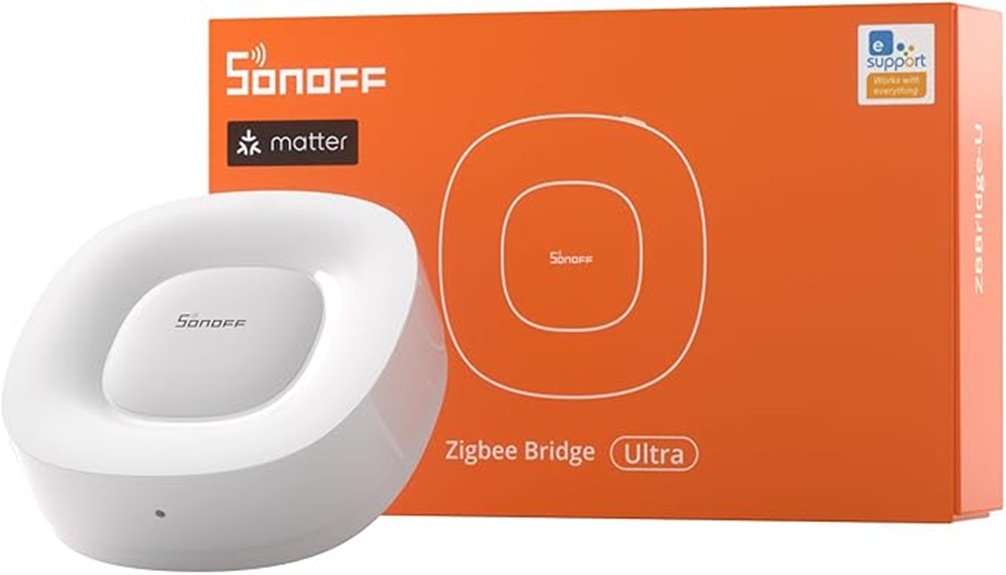
Anyone looking to seamlessly integrate Zigbee devices into a Matter-compatible smart home ecosystem will find the SONOFF Zigbee Bridge Ultra an ideal choice, especially when they already use SONOFF’s ecosystem. This hub supports SONOFF Zigbee sub-devices and acts as a Matter bridge, connecting Zigbee devices with the Matter ecosystem when on the same LAN. Powered by a Zigbee 3.0 chip and a dual-core processor, it delivers reliable performance for up to 256 devices with a range of 200 meters in open environments. It also features wired Ethernet and Wi-Fi for stable connectivity, along with security options like alarms and notifications, making it a versatile smart home centerpiece.
Best For: smart home enthusiasts seeking seamless Zigbee-to-Matter integration within the eWeLink ecosystem and existing SONOFF devices.
Pros:
- Supports up to 256 Zigbee devices with a long 200-meter range in open environments
- Acts as a reliable Matter bridge, enabling easy cross-platform device control on the same LAN
- Offers multiple connectivity options including Wi-Fi and wired Ethernet for stable performance
Cons:
- Limited to SONOFF Zigbee sub-devices and eWeLink ecosystem, reducing compatibility with other brands
- Requires being on the same LAN for Matter ecosystem integration, which may limit remote access flexibility
- May involve a learning curve for users unfamiliar with Zigbee or Matter protocol configurations
Factors to Consider When Choosing a Smart Home Hub With Zigbee and Matter
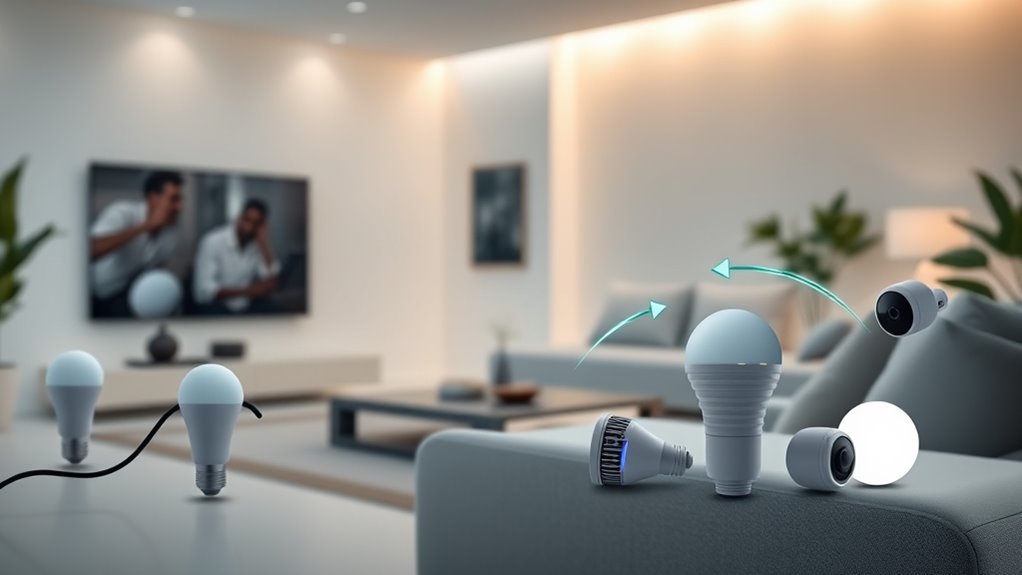
When selecting a smart home hub with Zigbee and Matter, I focus on how well it supports my devices and the protocols it uses. I also consider how easy it is to set up, how seamlessly it integrates into my existing ecosystem, and its security features. These factors help guarantee my smart home is reliable, secure, and simple to manage.
Compatibility With Devices
Choosing a smart home hub that works seamlessly with your devices hinges on compatibility. First, I check that the hub supports the specific Zigbee and Matter protocols my devices use. It’s essential to verify that the hub has been tested with my preferred brands and models to avoid connectivity issues later. I also verify that its firmware and software are regularly updated to support the latest standards, which helps with future device integration. Managing multiple device types, like sensors, switches, and bulbs, within Zigbee and Matter ecosystems is another key factor. Finally, I review the compatibility list to confirm it covers my current setup and planned additions. This approach guarantees a smooth, integrated smart home experience without surprises down the line.
Protocol Support and Range
Supporting multiple protocols like Zigbee, Thread, Bluetooth, Wi-Fi, and Matter is essential for a smart home hub, as it guarantees compatibility with a broad range of devices from different manufacturers. This flexibility is critical for integrating various gadgets and expanding your ecosystem seamlessly. Range also plays a significant role; some hubs offer up to 200 meters in open areas, which is ideal for large or multi-room setups. A hub’s protocol support directly impacts the stability and responsiveness of device automation, especially in complex environments. Dual-protocol hubs that combine Zigbee with Wi-Fi or Thread tend to offer more reliable connectivity and scalability. Ultimately, choosing a hub with broad protocol support and ample range ensures your smart home remains responsive, adaptable, and future-proof.
Ease of Setup
A smart home hub that’s easy to set up can make all the difference in creating a seamless automation experience. I look for straightforward setup processes, preferably with guided steps or quick-start guides. Many hubs now support mobile apps that simplify device pairing and configuration, which is especially helpful for beginners. Compatibility with familiar ecosystems like Apple HomeKit, Google Home, or Alexa often means I can start using my devices faster through familiar interfaces. Features like automatic discovery and onboarding, such as Magic Pair, save time by reducing manual setup. Clear indicator lights or notifications also help me quickly identify if the setup was successful or troubleshoot issues. Overall, an intuitive setup process minimizes frustration and gets my smart home running smoothly in no time.
Ecosystem Integration
When selecting a smart home hub with Zigbee and Matter, ensuring it works smoothly with your preferred ecosystems is vital for a seamless experience. I look for hubs that support platforms like Apple HomeKit, Google Home, Amazon Alexa, or SmartThings to guarantee easy device integration. Compatibility with protocols such as Zigbee, Thread, or Z-Wave is indispensable for connecting a broad range of devices. Supporting Matter is a game-changer, enabling cross-platform control and future-proofing my setup. I also prioritize hubs with local automation capabilities to reduce reliance on cloud services, enhancing privacy and reliability. Finally, OTA firmware updates are important to keep the hub compatible with evolving standards and devices, ensuring my smart home remains up-to-date and functional across ecosystems.
Security and Privacy
Choosing a smart home hub with Zigbee and Matter isn’t just about compatibility; security and privacy should be top priorities. I look for hubs that support end-to-end encryption to protect my device communications and keep my data safe. It’s also vital to know whether the hub processes data locally or relies heavily on cloud services, as local processing offers better privacy. Compatibility with security protocols like WPA3 and Zigbee’s built-in security features helps prevent unauthorized access. Regular firmware updates are essential to patch vulnerabilities and defend against emerging threats. Finally, I prefer hubs that allow me to restrict or disable remote access, limiting external control and enhancing my privacy. Prioritizing these factors ensures my smart home remains secure and private in a connected world.
Frequently Asked Questions
How Does Interoperability Differ Between Zigbee and Matter Hubs?
Interoperability is essential in smart home hubs, and Zigbee and Matter approach this differently. Zigbee relies on a specific protocol that requires compatible devices to connect smoothly, but it can be limited by manufacturer support. Matter, on the other hand, aims to unify various standards, making devices more universally compatible. I find Matter’s broader compatibility promising, as it simplifies connecting different brands and ecosystems for seamless smart home experiences.
Can Existing Smart Devices Upgrade to Matter Without Replacing Hubs?
Think of upgrading smart devices to Matter as upgrading your wardrobe—some pieces fit seamlessly, while others need tailoring. Usually, existing devices can upgrade via firmware updates, much like adding a new app. However, compatibility varies; some older devices might not support Matter without hardware upgrades or replacements. So, check your device’s firmware and manufacturer support first, but many devices are set for a smoother future with minimal hassle.
What Security Features Are Standard in Zigbee and Matter Compatible Hubs?
The current question about security features in Zigbee and Matter hubs is vital. I’ve found that most hubs include robust security measures like AES-128 encryption, secure device onboarding, and firmware updates. Matter hubs emphasize end-to-end encryption and device attestation, enhancing protection. I always recommend choosing hubs with these features to guarantee your smart home stays safe from hacking and unauthorized access.
How Do Hubs Manage Firmware Updates Across Multiple Protocols?
Managing firmware updates across multiple protocols can seem complex, but hubs handle it smoothly. I’ve found that most hubs automatically check for updates via their app or cloud service, then download and install them seamlessly. They prioritize security and compatibility, ensuring all connected devices stay current. This centralized process simplifies maintenance, so I don’t have to manually update each device, keeping my smart home secure and running efficiently.
Are There Specific Hubs Optimized for Voice Assistant Integration?
Did you know that over 80% of smart home users prioritize voice assistant integration? I find that hubs optimized for voice control really enhance convenience. I recommend looking for hubs that support popular assistants like Alexa, Google Assistant, or Siri, ensuring seamless voice commands across your devices. These hubs simplify managing your smart home, making everyday tasks effortless and more intuitive.
Conclusion
Choosing the right smart home hub is like selecting the perfect conductor for an orchestra—each device must work in harmony. With the best hubs supporting Zigbee and Matter, your smart home can run smoothly, like a symphony of convenience. Remember, the key is seamless connectivity. When you pick wisely, your devices come together effortlessly, turning your home into a beautifully coordinated space where everything plays in perfect harmony.
